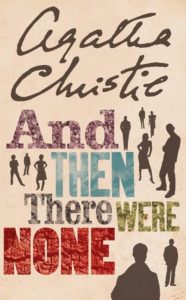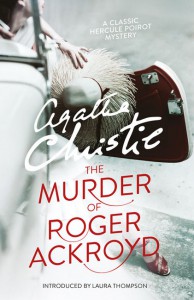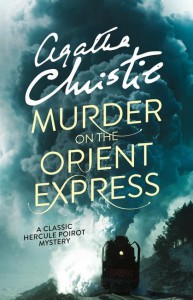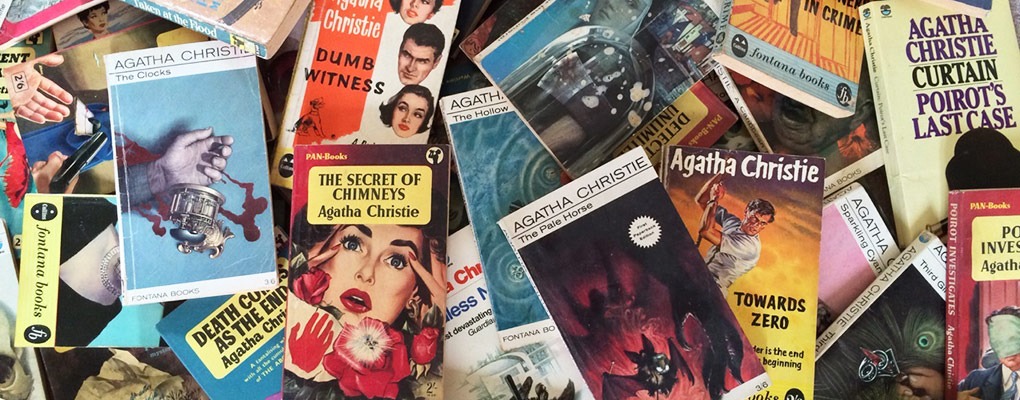Books
Ruth Ware on Agatha Christie
Ruth Ware is the author of the brilliant new psychological thriller In A Dark, Dark Wood – the story of a hen party that goes horribly wrong and ends in murder.
We asked Ruth to tell us about the inspiration behind her novel and the influence of the queen of crime, Agatha Christie.
Over to Ruth:
“I can’t remember when I read my first Agatha Christie but I was perhaps twelve or thirteen, maybe even younger. Reading her books wasn’t my first introduction to her world – I had been watching the Poirot and Miss Marple TV series over my mum’s shoulder for years, enshrining Joan Hickson and David Suchet as Christie’s most famous detectives in my imagination for ever. But when I finally did move on to the books, I was hooked, and raced through her best-known works before moving on to the more obscure ones: the Superintendent Battle novels, and the incredibly chilly standalones like Endless Night.
I’m not sure what it was that I liked so much. Was it the masterfully twisty plots, where everything clicks into place in the final chapter as neatly and satisfyingly as a completed sudoku? Was it the limpidly clear prose? Agatha Christie’s fame doesn’t rest on her writing style, but it is clean, clear and a masterclass in conveying maximum impact with the minimum of showy language and imagery. I briefly taught  English as a foreign language and found that Christie was one of the writers most often read as an introduction to ‘grown up’ English language texts, probably because her books are short and her prose is clean, uncluttered and easy to decode, unlike her plots.
English as a foreign language and found that Christie was one of the writers most often read as an introduction to ‘grown up’ English language texts, probably because her books are short and her prose is clean, uncluttered and easy to decode, unlike her plots.
Or maybe it was the sense of wrongs righted and balance regained which appealed to my teenage sense of justice. As an adult I love reading the likes of Karin Fossum and Susan Hill, where the end of the book doesn’t necessarily mean the villain is bang to rights and the mystery unravelled, but as a teenager I wanted a more clear-cut kind of justice.
Whatever the appeal, I loved her – in common with a lot of other people it turns out. And Then There Were None has sold over 100,000,000 copies making it one of the bestselling novels of all time, and she has been translated into 103 languages (I’m not sure I could even list 103 languages). Everyone’s bookshelf seems to have a dog-eared copy of The Murder of Roger Ackroyd, every holiday cottage a curling And Then There Were None, though perhaps under one of its less politically correct titles. Agatha Christie is one of those writers who have become so much part of the landscape that it’s hard to imagine a literary world without her detective characters, almost as impossible as envisaging one without Sherlock Holmes.
 It probably wasn’t surprising therefore that she should have had an effect on my first attempt at a crime novel. I knew as I was writing that I owed Christie a debt of inspiration, and Nina’s reference to And Then There Were None was a kind of tongue-in-cheek admission of that. But I didn’t realise quite how much my book owed to Christie until I had finished, and was reading it through.
It probably wasn’t surprising therefore that she should have had an effect on my first attempt at a crime novel. I knew as I was writing that I owed Christie a debt of inspiration, and Nina’s reference to And Then There Were None was a kind of tongue-in-cheek admission of that. But I didn’t realise quite how much my book owed to Christie until I had finished, and was reading it through.
It’s not that my characters are particularly similar to hers, nor is the book narrated like hers – Christie’s books are more often told in the third person, or from the point of view of a relative outsider like Captain Hastings. This helps to keep the atmosphere rather clinical, with emotion and grief held at a safe distance, and maintains the idea of detection as essentially a puzzle-solving exercise, rather than an activity steeped in gore and anguish. In a Dark, Dark Wood is more psychological thriller than crime puzzle, and emotions run high in a way that I think Christie would probably have disdained, but I couldn’t imagine side-lining the emotional fallout in quite the same way.
But the whole set up, with the closed set, the small cast of characters, and the unfolding clues is pretty much directly inspired by all the Christie novels I read as a child. Like Murder on the Orient Express or The Sittaford Mystery my characters are snow-bound, out of communication, unable to summon help. Like And Then There Were None, the diminishing cast of possible suspects gives a feeling of growing claustrophobia, particularly for Nora, as she contemplates the  horrifying possibility that someone she trusts might be involved. Like Cards on the Table, almost everyone involved has a motive, or a secret they are trying to hide, and someone is pulling on their strings. Like Sleeping Murder, my main character is sifting through unreliable memories, trying to find the key to a crime that has its roots in the past. Even the title – with its nursery rhyme roots – is a kind of homage to Christie, who mined children’s rhymes for so many of her own titles: A Pocket Full of Rye, Five Little Pigs, One, Two, Buckle My Shoe, and so on.
horrifying possibility that someone she trusts might be involved. Like Cards on the Table, almost everyone involved has a motive, or a secret they are trying to hide, and someone is pulling on their strings. Like Sleeping Murder, my main character is sifting through unreliable memories, trying to find the key to a crime that has its roots in the past. Even the title – with its nursery rhyme roots – is a kind of homage to Christie, who mined children’s rhymes for so many of her own titles: A Pocket Full of Rye, Five Little Pigs, One, Two, Buckle My Shoe, and so on.
Later in life, Agatha Christie reportedly became disenchanted with Poirot, as Conan Doyle had become with Sherlock Holmes. Calling him ‘insufferable’ and ‘an ego-centric creep’, she sought relief in killing him off in the novel Curtain, the manuscript of which was sealed in a bank vault and only released after her own death. Poirot certainly is pretty insufferable at times, but it’s telling that Christie couldn’t simply let him go – she chose to give him the dignity of a proper goodbye, and it’s an almost unbearably poignant one at times, with Poirot old and wheelchair-bound, and come full circle, back to Styles Court where his first case took place. After its publication, Poirot became the only fictional character (to date) to be accorded an obituary in the New York Times – a fitting feather in the cap of one of fiction’s greatest creations and one of which Poirot himself would have been justly proud, even while considering it no more than his undoubted due.”
2 Comments
Join the discussion
Please note: Moderation is enabled and may delay your comment being posted. There is no need to resubmit your comment. By posting a comment you are agreeing to the website Terms of Use.



I find it fascinating that Ware is so open about how she riffs (rips?) off other people’s work. Her contribution to the recent Marple collection was effectively a rewrite of possibly Dorothy L Sayers’ best-known Lord Peter short story, and The Lying Game is just Christie’s Five Little Pigs. And as for The Turn of the Key, it’s obviously The Turn of the Screw, but hey she’s a nice person so we’ll forgive her!
If Ruth Ware is half as good as Agatha Christie, she must be good. If she does not use obscene language, then I would be more than happy to rear her book. Please could we have a warning on book covers if the book contains obscene language?